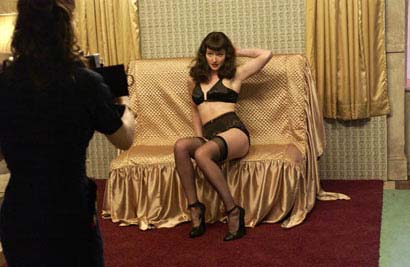 Movie number two from Somara’s recovery marathon!
Movie number two from Somara’s recovery marathon!
We saw a trailer for this one once, agreed that we wanted to see it, especially after catching a story about her on The History Channel (or was it E!?). I remember us sitting through the end of it, predicting the narrator reporting her death. How wrong we were. The producers ended the special with a rare interview of the elusive pin-up but in silhouette at her insistence. She didn’t want to disappoint fans with reality. Meanwhile this movie wasn’t in any Austin theaters for long or at all despite the buzz at SXSW 2006. Could’ve been a straight-to-cable thing such as Reefer Madness: The Musical.
The film begins with an undercover sting operation at an adult bookstore which is hilarious by today’s standards; if you ever come to Texas, these places are impossible to avoid seeing along I-35. Still, the point of it was to establish the era’s mood: Senator Kefauver (Strathairn, always great) is on his tear against “dangerous” materials such as dirty pictures, horror comics and anything else that could be blamed on the anti-social behavior of teenagers in the Fifties. Not to spoil the plot, the bust and Congressional hearings act as foreshadowing on how the story ends—if you’re not familiar with Bettie’s life.
Then time rewinds to rural Tennessee in the Thirties. Even as a pre-teen, Bettie is shown as a rather popular, attractive girl. It upsets her socially conservative, super religious parents. There are other details covering her background (a failed first marriage, college, etc.) I’ll skip on. My goal is to review, not retell the whole story. How much of it is true can only be verified by Mrs. Page or an official biographer. Other events in Bettie’s life are truncated to get right to the key period everyone knows, her “sordid” career from the early to mid Fifties in New York and Florida.
Much like thousands of young people after WWII, Bettie leaves for NYC to pursue acting and modeling. It’s not a far-fetched idea since she studied it in college and had past experience. The going is tough but she’s an optimistic, upbeat person. One day while walking through a park, she meets a policeman who’s also a photographer. They strike up a conversation and this eventually leads to her pin-up career with Irving Klaw and Bunny Yeager. You learn that she’s also naive, if the movie is to be believed. To clarify, Bettie isn’t gullible to the point of stupid because no harm comes to her; the handlers make sure of this. She’s unaware of the pictures’ purpose, context and enemies. To her, these peculiar photo shoots were just the equivalent to modern cos-play or acting exercises she studies on the side. As for the nudity? Bettie doesn’t see the harm in it. These are pictures, not instructions, and her rationalization is usually derived from her interpretation of the Bible: Adam and Eve were “naked” too.
When Bettie is called before Kefauver’s hearing, she has a change of heart (or epiphany) yet she was never called to testify. The movie takes a stab on the “why.” Only Mrs. Page can truly answer this. Despite her reasons, her fans do know that she quit everything related to modeling, acting, etc., and became a more devout Christian, proselytizing to anyone willing to listen. Then followed obscurity and mystery until the Eighties.
The people involved in making Bettie did a solid job presenting this as a serious, amusing tale about the “notorious” period of her life. It can’t help but be an R-rated movie due to the subject matter yet it doesn’t sink to arbitrarily showing Bettie (Gretchen Mol) naked unless it’s relevant to the story. The use of black-and-white supports my point against the nudity being thrown in to attract an audience a la Showgirls. It serves the bigger purpose of setting the tone of the Fifties as Americans seem to collectively remember them; how ideal it was when there were no “gray” moral areas. When Bettie visits Florida, it shifts to color to amplify the sunny nature of the place. Maybe it emphasizes the protagonist’s fondness for Miami.
Her religious nature isn’t ridiculed into something cartoonish neither. It was a part of her character which is why her “conversion” seemed genuine. I use quotes because I don’t think Bettie ever quit being a Christian. She chose to re-embrace her faith on a more involved level and rebuilt her new career around it. She wasn’t painted into a moral corner like most reborn “Christians” who use the process to absolve past misdeeds; see Charles Colson and Gary Busey.
I used to dismiss the Bettie Page revival in the Eighties because I didn’t get it. Being a comic-book fan, it could be embarrassing showing non-geek friends your favorite shop and there’d be one of those well-done Dave Stevens posters. “Oh, you’re socially adjusted. Uh huh,” is going through their minds, especially the female chums. Anyway, I figured she was another unattainable, lame ideal woman from the past like the overrated Marilyn Monroe. After reading an article about her by Buck Henry and seeing the TV special I mentioned earlier, I think I understood the interest (or obsession). Bettie Page represents a standard of beauty, erotic or not, before the West became obsessed with thin blondes under 25 needing airbrushed assistance.
